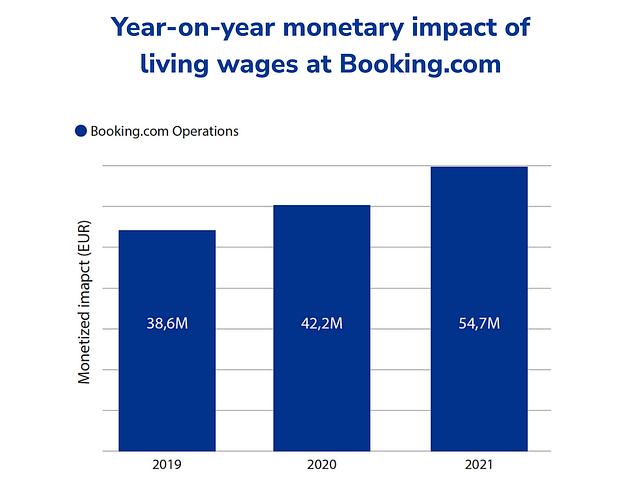Amsterdam-Based Booking.com Delivers €3.6 Billion Net Contribution to Dutch Economy
A new study by KPMG based on its true value methodology examines economic, social, and environmental impacts of Booking.com in the Netherlands

Booking.com creates a large positive impact in the Netherlands. This is the finding of a new study by consultancy KPMG based on its True Value methodology. This research project provides a holistic assessment of Booking.com’s economic, social and environmental impact in the Netherlands.
The study values Booking.com’s net-contribution to Dutch society at €3.6 billion from 2019–2021. Booking.com’s headquarters in Amsterdam accounts for 57% of the estimated societal value creation. The remaining 43% of the value is attributable to Booking.com’s positive impact on accommodation providers throughout the Netherlands, who benefit from additional demand for their services by being listed on Booking.com.

The largest part of the upside can be attributed to the economic and social impacts from operations, while the negative effects arise mainly from greenhouse gas emissions.
True Value Methodology
By assigning a monetary value to the natural and social dimensions of Booking.com’s business model, it quantifies costs and benefits, which might otherwise be overlooked, and allows for a more holistic understanding of Booking.com’s net contribution to the Dutch economy, society, and natural environment. The analysis was built upon Booking.com’s data, but the valuation factors were derived from reliable third party sources such as governmental papers and scientific research.
Our platform’s global reach allows us to effectively match global demand with local supply, and thus generate incremental bookings, increase national income and boost tourism spending and, ultimately, job-creation.
The True Value analysis focuses on the identification and valuation of the impacts generated by Booking.com’s operations, and that by our accommodation partners in the Netherlands. This includes the additional revenue realised by accommodations through working with Booking.com as well as the associated environmental and social impacts of these incremental stays.
Other environmental and social impacts generated by tourists when staying at the hospitality partners of Booking.com, such as the food waste generated at establishments other than the property partners or carbon footprint of the transportation they have taken, are not in scope as they are not under the influence of Booking.com. The analysis covers a three year period from 2019 to 2021.
The table below provides an overview of the impacts in scope of this report and their societal impact.
Economic impact
Headquartered in Amsterdam, Booking.com has contributed €1.9 billion to the national income from 2019 to 2021 by purchasing local services, creating employment, and paying taxes. Our platform’s global reach allows us to effectively match global demand with local supply, and thus generate incremental bookings, increase national income and boost tourism spending and, ultimately, job-creation. The study estimates this economic impact at €1.6 billion for tourism spend and €12.5 million in local tourism tax collections. However, the study may have underestimated the impact due to the Covid-19 pandemic’s effect on the tourism industry as a whole and our company in particular.
Socio-economic impact
Booking.com creates socio-economic impact in several dimensions — some of which could only be assessed qualitatively. This includes Booking.com enabling geographic dispersion and thereby reducing the pressures of over-tourism on certain locations.
Additionally, Booking.com plays an active role in attracting international talents, which positively impacts the highly-skilled labour shortage in the Netherlands, especially in the Information Technology sector. For example, in 2020–2021, 68% of its total attrition moved on to other firms within the Netherlands, and 43% of its total attrition stayed in the Information Technology sector.

Booking.com pays above living wages to its employees in the Netherlands, improving their quality of life. The quality of life improvements due to Booking.com’s above living wages is valued at €135,5 million over the study period. The report notes that there is room for improvement when it comes to equal pay between males and females. While employees in the same role and same department are paid equally, females are underrepresented in more senior and leadership roles.
At Booking.com, we believe that travel is a force for good in the world. By the same token, we want to be a positive force within Dutch society
Environmental impact
Booking.com has three main environmental impact categories: greenhouse gas emissions, waste generation, and water consumption. Zooming in on the most material finding: Booking.com, our suppliers and accommodation partners emit greenhouse gases, which amounts to a negative externality of €18,2 million over a three year period (2019–2021), 73% of which is attributable to the incremental nights booked with property partners.
Water consumption has an estimated negative impact of €0.8 million, and waste generation has a monetised negative impact of €0.01 million. Some potential negative impacts, like air pollution, couldn’t be quantified due to data limitations. However, these environmental impacts are relatively small and unlikely to materially affect the overall assessment.
In closing
At Booking.com, we believe that travel is a force for good in the world. By the same token, we want to be a positive force within Dutch society; our goal is to demonstrate commitment to sustainable development and exemplify corporate citizenship. A first step in delivering on this ambition is to understand the state of play. We’ve learned a great deal from this independent assessment by KPMG and are excited to share the findings with you. As Booking.com HQ moved into the new campus in Amsterdam, we look forward to the next chapter of our journey together.
